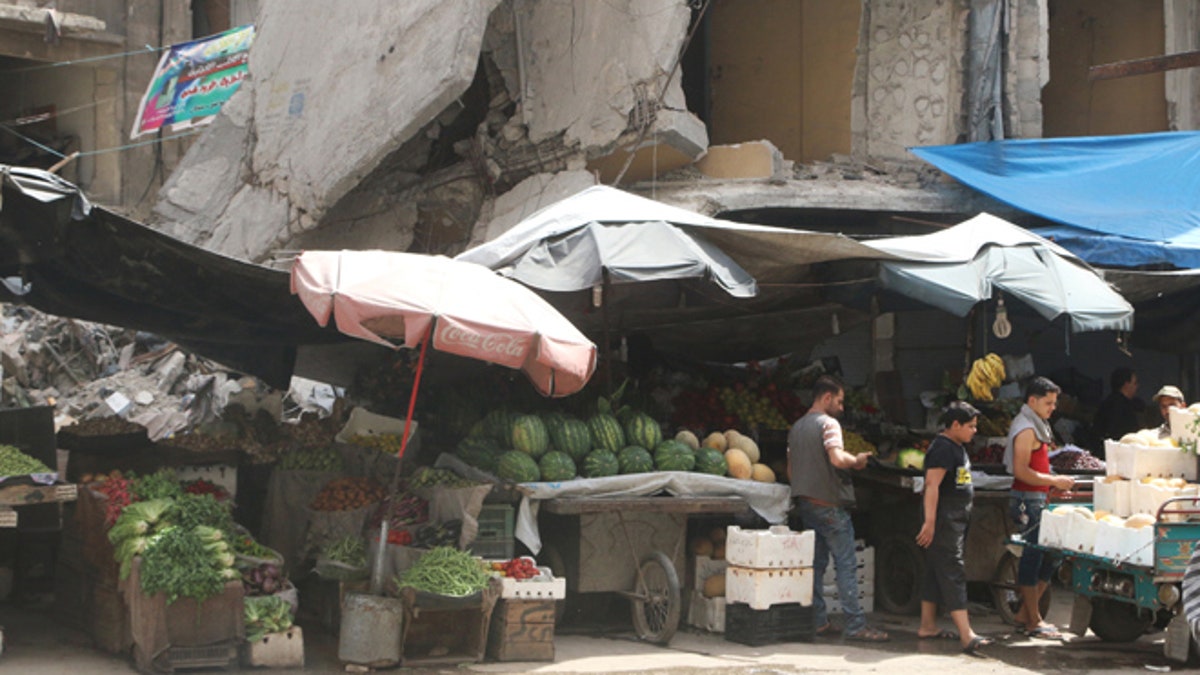
Vendors wait for customers near their stalls erected in front of damaged buildings during the holy month of Ramadan in the rebel held area of Aleppo's al-Shaar district, Syria, June 15, 2016. REUTERS/Abdalrhman Ismail - RTX2GDRZ
An international advocacy group on Wednesday accused the United Nations of prioritizing its relationship with the Syrian government over delivering aid to civilians in need, saying the world body is "in serious breach of its humanitarian principles."
The Beirut-based Syria Campaign said in a scathing report that the U.N. has "allowed the Syrian government to direct aid from Damascus almost exclusively into its territories," at the expense of establishing regular aid access to hundreds of thousands of Syrians besieged by government forces.
A spokesman for Secretary-General Ban Ki-moon said the accusation "discredits the work of national and international humanitarian aid workers."
"The U.N. has never shied away from calling out the parties in the conflict, including the Syrian government, for hampering the humanitarian work of the UN in Syria," said Stephane Dujarric.
The U.N. estimates that some 500,000 Syrians are trapped across 18 besieged areas in the country, most of them encircled by government forces, while the monitoring group Siege Watch puts the tally at 1 million.
In press briefings and reports to the Security Council, U.N. officials regularly acknowledge that President Bashar Assad's government refuses to allow critical aid to enter the areas it besieges -- or, at the last moment, it forces relief workers to offload food and medical supplies from their convoys.
The U.N. and its partners nevertheless reach over six million people with aid every month, according to the Secretary-General's office. The U.N.'s resident coordinator in Syria, Yacoub El Hillo, said the world body would not "condemn people in non-besieged areas to starvation," just because besieged areas are beyond reach.
But U.N. reports and former officials question the world body's accounting.
In a March 2016 self-evaluation of its Syria crisis response, the U.N.'s humanitarian coordination office OCHA said it had no systematic means to assess "needs within Government territory, nor the impact of work done to date, or even, arguably, where the majority of assistance has gone."
Though humanitarian principles call on impartial parties to deliver aid in conflicts, the U.N. and other Damascus-based international relief organizations rely on the government-affiliated Syrian Arab Red Crescent, according to the former chief of the UN's Palestinian refugee relief agency in Syria, Roger Hearn.
"Once they give aid to the SARC or to other agencies, they lose control," said Hearn, who said most requests to monitor aid distributions are rejected by Damascus. The U.N. and other NGOs "literally don't have that line of sight about where (the aid) is going," he said.
El Hillo said just 2 percent of the aid distributed by the Syrian Arab Red Crescent does not reach beneficiaries.
The Syria Campaign report , which relies on anonymous testimony from U.N. officials as well as public reports, recommends that the world body "suspends cooperation" with Damascus if the Syrian government continues to infringe on the U.N.'s independence.
It accuses the U.N. of failing to use its leverage with Assad's government. "The government needs U.N. aid to support vast numbers of citizens," the report said.
A 2011 government crackdown on popular demonstrations calling for reforms sparked a violent civil war that has drawn fighters from around the globe and divided the U.N.'s Security Council. The U.N. says only a political solution can resolve the conflict.
"It was only in November 2015 that key member states agreed to come to the same room and discuss Syria, face to face. This in itself is a failure," said El Hillo. "All member states with influence are responsible, and chiefly the Security Council."
A Syrian government official meanwhile denounced the presence of Western troops in northern Syria, singling out French and German special forces in the Manbij and Kobani areas, calling it an "aggression on Syria's independence and sovereignty," in comments carried by state media.
Last week, Kurdish-led Syrian forces backed by U.S. and coalition airstrikes advanced on an Islamic State stronghold in northern Syria, besieging the town of Manbij. If the advance succeeds it would deal a major blow to the extremist group and sever a key supply route between the Turkish border and IS' self-styled capital, Raqqa.
French officials confirmed that French special forces were with the Kurdish-led Syrian Democratic Forces, offering training and advice. The U.S. has 300 special forces embedded with the SDF as well. The White House has said the forces are there in an advisory capacity.
Germany's Defense Ministry said in comments to The Associated Press Wednesday that it had not deployed any forces in any capacity to Syria.
However, the Britain-based Syrian Observatory for Human Rights, which relies on a network of activists on the ground, said there were nearly two dozen German military personnel in the area working alongside French and U.S. special forces. The head of the Observatory, Rami Abdurrahman, said locals and fighters have reported the presence of the German military advisers. He had no further details.








































